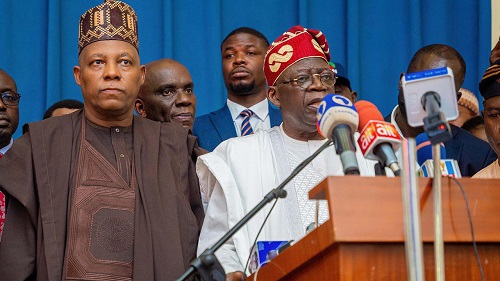Start Total Christian Certification Course Now
As PEPC admits President’s Chicago varsity records, visa as exhibit
President Bola Tinubu and Vice President Kashim Shettima will, today, open their defence in the petition by presidential candidate of Labour Party (LP), Mr. Peter Obi, and his party, challenging their declaration as winners of the February 25 presidential election.
The five-man panel of the Presidential Election Petition Court (PEPC) had fixed the date after Independent National Electoral Commission (INEC), which conducted the disputed poll, closed its case.
This came as the court admitted as exhibit, educational documents of President Bola Tinubu from the Chicago State University. The documents, which were tendered to establish his attendance and graduation, included the admission letter offered Tinubu.
Through his lead counsel, Chief Wole Olanipekun, Tinubu also tendered his United States visa documents. Tinubu also made available to the court documents of the Nigeria Immigration Service (NIS), with a view to debunking allegations of criminality contained in the petition against him.
The documents were admitted, in spite of stiff objections by Peoples Democratic Party and former Vice President Atiku Abubakar. Meanwhile, after the evidence of INEC’s sole witness, Dr. Lawrence Bayode, a Deputy Director at the commission’s ICT department, and adoption of his statement on oath, deposed to on April 10, 2023, INEC’s lead counsel, Abubakar Mahmoud, announced closure of the case.
Leading the witness in evidence, Mahmoud tendered cloud trail logs and a certification in evidence, which the court admitted as exhibit. Under cross-examination by Chief Wole Olanipekun, counsel to Tinubu and Shettima, the witness agreed that the foundation of any election by INEC is results recorded in Form EC8A, and that blurred results downloaded from INEC’s IReV (result viewing portal) will not affect entries in the form.
The witness agreed with Olanipekun that the e-Naira policy launched in October 2021 was not activated due to technological impediments and that the e-Naira app had to be taken down from Google Play to fix glitches, shortly after it was launched.
He agreed with Tinubu’s lawyer that elections are practically concluded at polling units, when presiding officers input results into Form EC8A, announce the results to party agents, sign the form, and snap the same with the Bimodal Voter Accreditation System (BVAS) machine.
When Olanipekun asked the witness if authenticity of any election by INEC is rooted in Forms EC8A and EC8E, the witness said yes. The witness added that blurred document downloaded from INEC’s IReV would not affect physical results in Form EC8A because the image is not relevant. He said the election ended with recording, snapping, and sending of results to IReV.
Answering questions from counsel for All Progressives Congress (APC), Lateef Fagbemi, the witness told the court that INEC used physical results in Form EC8A to compute results of the presidential election.
Bayode said glitches during the presidential election did not affect collation of results and that, if what was downloaded to INEC’s portal was unclear, physical results could be obtained to get required information.
Under cross-examination by counsel to the petitioners, Mr. Patrick Ikwueto, Bayode agreed that e-transmission application was tested on February 4, 2023 before it was deployed for use during the presidential election.
Ikwueto tendered the report of the test in evidence, and while INEC did not object to its admissibility, Tinubu, Shettima and APC, listed as second to fourth respondents, objected and promised to give reasons at the address stage.
The court, nevertheless, admitted the document as exhibit. The witness agreed with Ikwueto that report of the e-transmission application identifies remediation needed to resolve high vulnerability identified. After the testimony of the sole witness, Mahmoud announced the closure of INEC’s defence.














